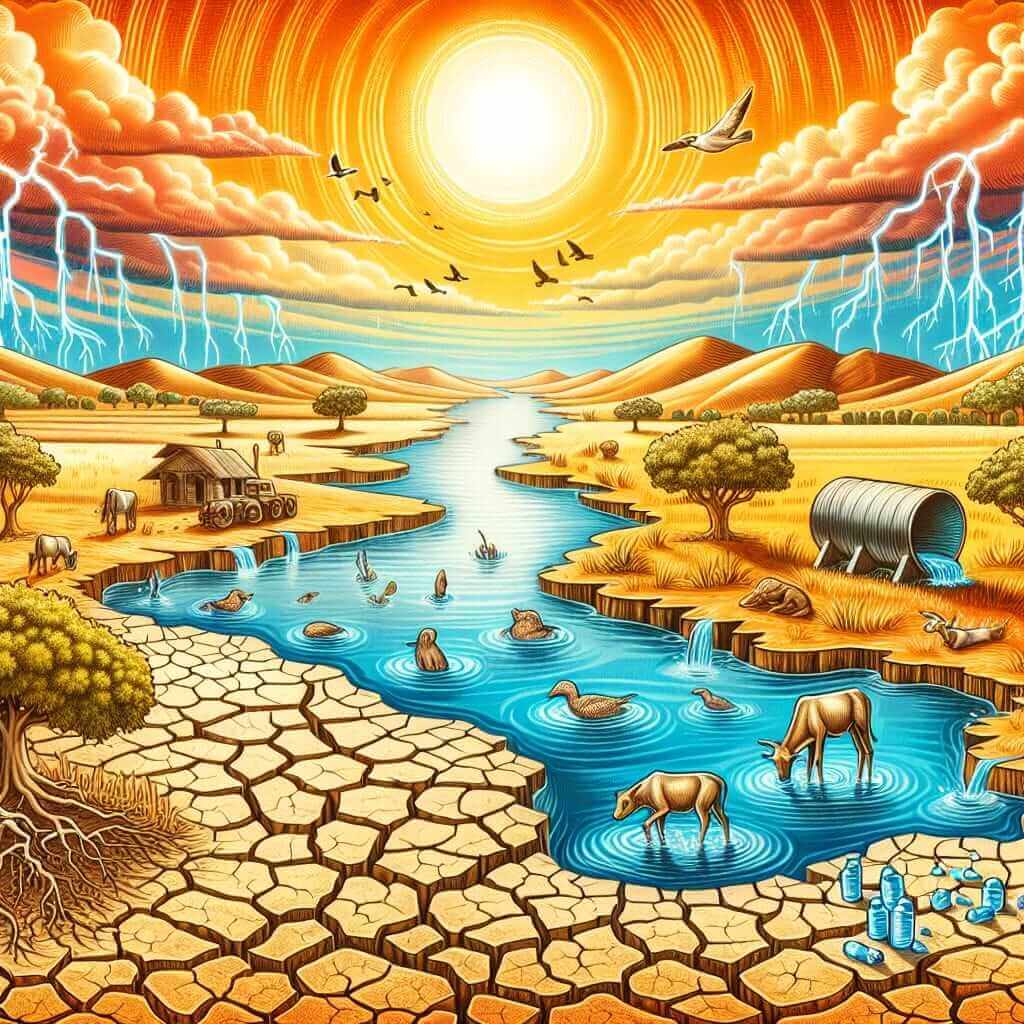The phrase “The effects of climate change on freshwater resources” is a significant topic within the IELTS exam, often appearing in the Writing Task 2 section. This essay will delve into this critical issue, providing insights, vocabulary, and a model answer to help you excel in your IELTS writing.
Understanding the Topic and Potential IELTS Questions
Climate change has a profound impact on our planet, and its effects on freshwater resources are particularly alarming. Understanding this complex relationship is crucial for IELTS candidates. Here are some potential IELTS Writing Task 2 questions related to this topic:
- Climate change is severely impacting freshwater resources globally. What are the main consequences of this, and what measures can be taken to mitigate these effects?
- Many argue that water scarcity due to climate change is the most pressing global challenge. To what extent do you agree or disagree?
- Discuss the effects of climate change on water availability. What solutions can individuals and governments implement to ensure sustainable freshwater resources for the future?
Sample IELTS Essay: Climate Change and Freshwater Resources
Let’s choose the first question for our model essay:
Climate change is severely impacting freshwater resources globally. What are the main consequences of this, and what measures can be taken to mitigate these effects?
Model Essay:
Climate change, an unprecedented global phenomenon, is wreaking havoc on freshwater resources worldwide. This essay will delve into the significant consequences of this environmental crisis and explore potential solutions to mitigate its adverse effects.
One of the most alarming impacts of climate change on freshwater resources is the alteration of precipitation patterns. Rising global temperatures lead to increased evaporation, resulting in more frequent and intense droughts in some regions. Conversely, other areas experience heavier rainfall and flooding, contaminating freshwater sources and causing widespread damage. Such unpredictable weather patterns severely disrupt agricultural practices, leading to food shortages and economic instability.
Furthermore, the melting of glaciers and ice caps due to global warming significantly contributes to rising sea levels. This poses a grave threat to coastal communities and freshwater aquifers, as saltwater intrusion contaminates groundwater reserves, rendering them unusable for human consumption and agriculture. The depletion of freshwater sources, coupled with population growth, will likely exacerbate water scarcity, leading to conflicts and mass displacement.
Addressing this critical issue requires a multi-faceted approach. Governments and international organizations must prioritize climate change mitigation by investing in renewable energy sources, promoting sustainable land management practices, and implementing stricter regulations on industrial emissions. Simultaneously, adaptation strategies, such as developing drought-resistant crops and improving water management infrastructure, are crucial to cope with the changing climate.
In conclusion, climate change’s impact on freshwater resources presents a significant challenge to humanity. By acknowledging the severity of this issue and implementing comprehensive mitigation and adaptation measures, we can strive towards a future where access to clean and safe water is secured for all.
(Word count: 286 words)

IELTS Writing Tips and Vocabulary
Key Vocabulary:
- Climate change: Long-term shifts in temperatures and weather patterns.
- Freshwater resources: Sources of water with low salt concentration, such as rivers, lakes, and groundwater.
- Precipitation: Any form of water falling from the atmosphere, like rain, snow, or hail.
- Drought: A prolonged period of abnormally low rainfall, leading to water shortages.
- Glaciers: Large masses of ice that form over land from accumulated snowfall.
- Sea-level rise: The increase in the average level of the ocean’s surface.
- Saltwater intrusion: The movement of saline water into freshwater aquifers, making them unusable.
- Mitigation: Actions taken to reduce or prevent the severity of an issue.
- Adaptation: Adjustments made to cope with the effects of a changing environment.
- Sustainable: Meeting the needs of the present without compromising the ability of future generations to meet their own needs.
Grammar and Structure:
- Use a range of grammatical structures: Employ complex sentences, relative clauses, and varied sentence structures to demonstrate grammatical range and accuracy.
- Link your ideas effectively: Utilize cohesive devices such as conjunctions (e.g., however, therefore, furthermore) and transition words (e.g., additionally, moreover, consequently) to ensure a smooth flow of ideas.
- Maintain a formal register: Avoid contractions, informal language, or slang. Use academic vocabulary and a formal tone throughout your essay.
Conclusion
The effects of climate change on freshwater resources are multifaceted and demand immediate attention. By understanding the complexities of this issue, equipping yourself with relevant vocabulary, and practicing your writing skills, you can confidently tackle IELTS Writing Task 2 questions related to this pressing global concern. Remember to analyze the question carefully, plan your essay logically, and present your arguments clearly and convincingly.
For further practice, explore these related topics:
- The effects of climate change on water availability
- The impact of climate change on water resources
- The effects of climate change on energy resources
- The impact of climate change on the global food supply
- The effects of climate change on wildlife conservation